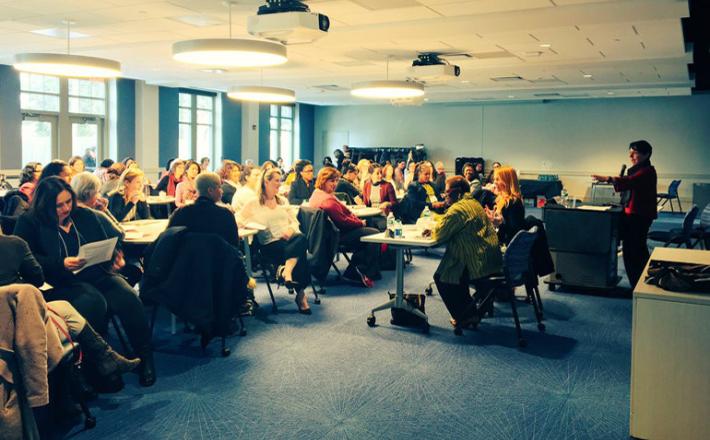The emerging strategy for capitalizing on women's unprecedented interest in politics in the United States
Source:
Jean Sinzdak could see right away that this year would be different for women in politics. For the first time in her 12 years of running a seminar for women interested in public office, she had to start a waitlist.
Registrations for the “Ready to Run” program, run by Rutgers University’s Center for American Women and Politics (CAWP), began pouring in after the presidential election. Whether it was Hillary Clinton’s loss or Donald Trump’s victory despite multiple sexual harassment accusations and a video that shows him brag about grabbing women, the election results have been a mobilizing force.
“We had a lot of women who said, ‘I never considered running myself, but this year I woke up or I realized I had to do it,’” says Sinzdak, the associate director for CAWP.
The program’s 18 partners across the country have reported similar results as have other organizations that help women run for office. EMILY’s List, for example, reported in March that a record 10,000 women had reached out about running for office since November. That’s roughly 10 times the number that approached the organization during the entire 2016 election cycle. VoteRunLead also reported an unprecedented 6,545 women have so far signed up to learn about campaigning.
This kind of mobilization has happened before, so organizers are challenged with figuring out how to keep the current energy going.
In October 1991, 35-year-old law professor Anita Hill testified for three straight days before the U.S. Senate Judiciary committee about sexual harassment she said she had experienced while working for Clarence Thomas, who was being vetted for the U.S. Supreme Court. Millions of Americans watched as she detailed embarrassing and offensive sexual comments before an all-white, all-male panel that went on to confirm Thomas’ nomination.
“Women were literally seeing their underrepresentation for the first time,” says Kelly Dittmar, a political science professor and scholar at CAWP. “There was a very visceral reaction, especially in the context of what she was talking about.”
CAWP's Dittmar says sustaining the long-term interest among women will largely depend on where their discontent comes from. If they simply don’t like Trump, there’s a good chance their motivation can fade. But if it’s because of either party's politics, that’s more sustainable.
Click here to read the full article published by Governing on 25 April 2017.

Jean Sinzdak could see right away that this year would be different for women in politics. For the first time in her 12 years of running a seminar for women interested in public office, she had to start a waitlist.
Registrations for the “Ready to Run” program, run by Rutgers University’s Center for American Women and Politics (CAWP), began pouring in after the presidential election. Whether it was Hillary Clinton’s loss or Donald Trump’s victory despite multiple sexual harassment accusations and a video that shows him brag about grabbing women, the election results have been a mobilizing force.
“We had a lot of women who said, ‘I never considered running myself, but this year I woke up or I realized I had to do it,’” says Sinzdak, the associate director for CAWP.
The program’s 18 partners across the country have reported similar results as have other organizations that help women run for office. EMILY’s List, for example, reported in March that a record 10,000 women had reached out about running for office since November. That’s roughly 10 times the number that approached the organization during the entire 2016 election cycle. VoteRunLead also reported an unprecedented 6,545 women have so far signed up to learn about campaigning.
This kind of mobilization has happened before, so organizers are challenged with figuring out how to keep the current energy going.
In October 1991, 35-year-old law professor Anita Hill testified for three straight days before the U.S. Senate Judiciary committee about sexual harassment she said she had experienced while working for Clarence Thomas, who was being vetted for the U.S. Supreme Court. Millions of Americans watched as she detailed embarrassing and offensive sexual comments before an all-white, all-male panel that went on to confirm Thomas’ nomination.
“Women were literally seeing their underrepresentation for the first time,” says Kelly Dittmar, a political science professor and scholar at CAWP. “There was a very visceral reaction, especially in the context of what she was talking about.”
CAWP's Dittmar says sustaining the long-term interest among women will largely depend on where their discontent comes from. If they simply don’t like Trump, there’s a good chance their motivation can fade. But if it’s because of either party's politics, that’s more sustainable.
Click here to read the full article published by Governing on 25 April 2017.